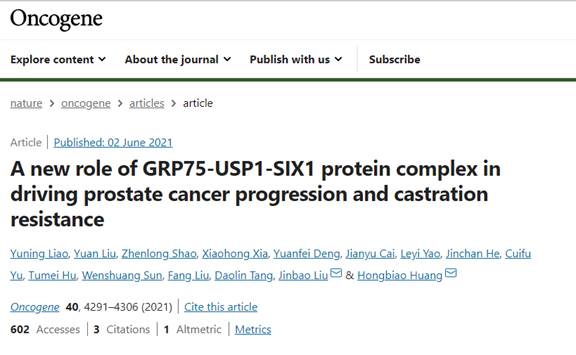 Oncogene. 2021 Jun;40(25):4291-4306. doi: 10.1038/s41388-021-01851-0.
Oncogene. 2021 Jun;40(25):4291-4306. doi: 10.1038/s41388-021-01851-0.
A new role of GRP75-USP1-SIX1 protein complex in driving prostate cancer progression and castration resistance.
Yuning Liao, Yuan Liu, Zhenlong Shao, Xiaohong Xia, Yuanfei Deng, Jianyu Cai, Leyi Yao, Jinchan He, Cuifu Yu, Tumei Hu, Wenshuang Sun, Fang Liu, Daolin Tang, Jinbao Liu & Hongbiao Huang
1 Affiliated Cancer Hospital & institute of Guangzhou Medical University, Guangzhou, Guangdong, China
2 Guangzhou Municipal and Guangdong Provincial Key Laboratory of Protein Modification and Degradation, School of Basic Medical Sciences, Guangzhou Medical University, Guangzhou, Guangdong, China
3 Department of Pathology, First People’s Hospital of Foshan, Foshan, Guangdong, China
4 Department of Surgery, The University of Texas Southwestern Medical Center, Dallas, TX, USA
Prostate cancer (PC) is the second most common cancer with limited treatment option in males. Although the reactivation of embryonic signals in adult cells is one of the characteristics of cancer, the underlying protein degradation mechanism remains elusive. Here, we show that the molecular chaperone GRP75 is a key player in PC cells by maintaining the protein stability of SIX1, a transcription factor for embryonic development. Mechanistically, GRP75 provides a platform to recruit the deubiquitinating enzyme USP1 to inhibit K48-linked polyubiquitination of SIX1. Structurally, the C-terminus of GRP75 (433-679 aa) contains a peptide binding domain, which is required for the formation of GRP75-USP1-SIX1 protein complex. Functionally, pharmacological or genetic inhibition of the GRP75-USP1-SIX1 protein complex suppresses tumor growth and overcomes the castration resistance of PC cells in vitro and in xenograft mouse models. Clinically, the protein expression of SIX1 in PC tumor tissues is positively correlated with the expression of GRP75 and USP1. These new findings not only enhance our understanding of the protein degradation mechanism, but also may provide a potential way to enhance the anti-cancer activity of androgen suppression therapy.
文章链接https://www.nature.com/articles/s41388-021-01851-0
